Reflecting on the news that his epic sci-fi adaptation Dune would premiere simultaneously on HBO Max and in cinemas, director Denis Villeneuve complained that watching the film on your television would be like “driving a speedboat in your bathtub.” Now that I’ve seen the film, I’m inclined to agree. Dune is massive, achieving a sense of scale most blockbusters could only dream of, and most certainly can’t be contained by a small screen.
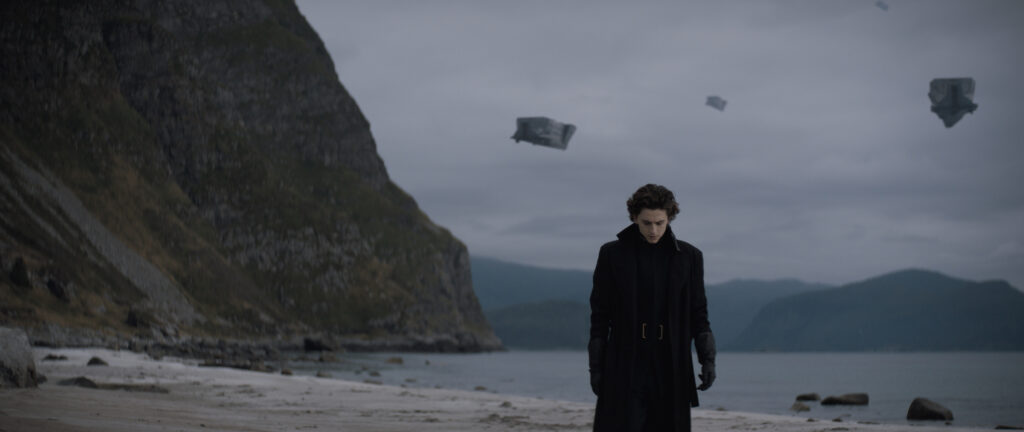
The sheer magnitude of Dune is fitting of Frank Herbert’s 1965 long, dense and immensely popular novel, considered by many to be the canonical sci-fi text – and certainly one of the most influential. It’s also the source of a protracted, messy cinematic history: Alejandro Jodorowsky’s aborted 1970s version is one of film’s great ‘what-if’s, while David Lynch’s 1984 attempt was a disastrous critical and commercial flop that the director has since disowned. But if the novel has received a reputation as something of a poisoned chalice for filmmakers, you truly wouldn’t know it from this new adaptation – a work of such confidence and control it makes you wonder whether those who dubbed it “unfilmable” just weren’t thinking big enough.
In the year 10,191 A.G., the rule of the hostile desert planet Arrakis is in the process of being transferred by imperial decree from the villainous House Harkonnen, who have oppressed the indigenous Fremen people for eighty years, to House Atreides, led by the benevolent Duke Leto Atreides (Oscar Isaac). Arrakis is prized for its natural abundance of “spice”, a priceless psychoactive substance that extends life and makes interstellar space travel possible – in other words, a source of unimaginable power and wealth that the grotesque Baron Vladimir Harkonnen (Stellan Skarsgård, in some serious prosthetics) will not relinquish without a fight.
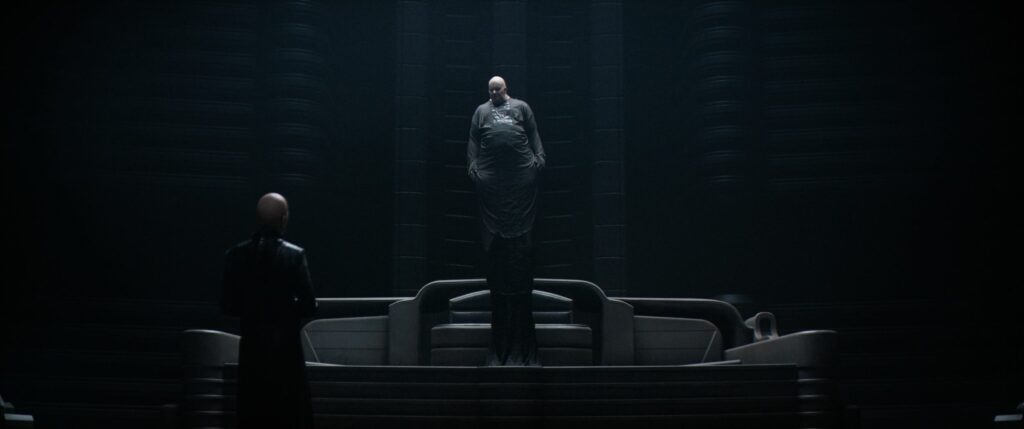
Back on his home planet of Caladan, the Duke’s son and heir Paul (Timothée Chalamet) is having apparitions of a Fremen woman (Zendaya), which have something to do with the superhuman abilities he has learnt from his mother Jessica (Rebecca Ferguson). She belongs to another faction altogether: the Bene Gesserit, a mysterious matriarchal order of psychics with considerable political power. For millennia, the sisterhood has engaged in eugenic programming to create the Kwisatz Haderach – the prophesised messiah that Jessica believes could be Paul.
Chalamet is serviceable in the brooding lead role, but it’s the committed supporting performances from the rest of the star-studded cast – Josh Brolin, Jason Momoa, Charlotte Rampling, Javier Bardem and Chang Chen among them – that really hold the interest. The film depends on Isaac and Ferguson especially to ensure the emotional beats land. (As for humour, you’ll find little of that here – the film’s two jokes are those used in the trailer; the movie can’t even manage a smile when it shows us that the only way to safely traverse Arrakis’ vast deserts is by doing an ostentatious “sandwalk” that Monty Python would be proud of.)
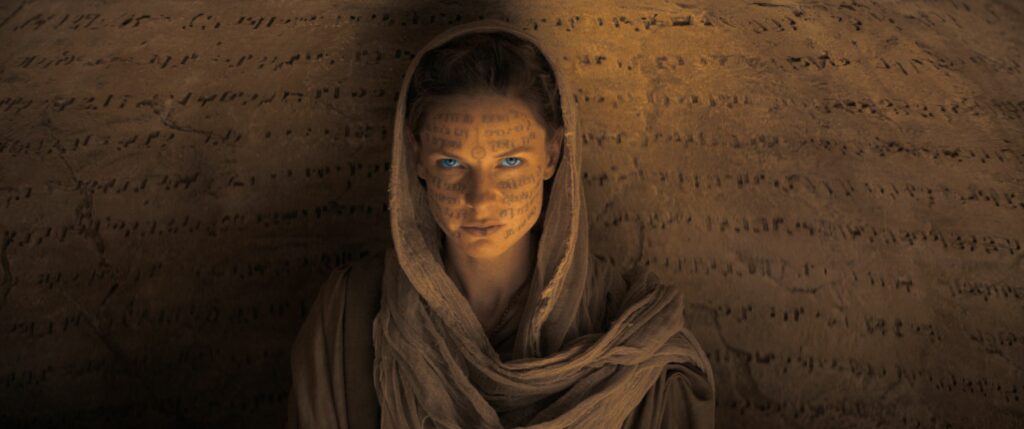
Of course, in a film like this, character often takes a back seat to set-piece spectacle, and it’s here that the film is at its most immersive. Villeneuve’s taste for zoomed-out, effects-heavy grandeur, seen previously in Arrival and Blade Runner 2049, has been honed to near-perfection. The first appearance of Herbert’s most iconic creation – the impossibly gigantic sandworms that lurk beneath Arrakis’ sandy surface – is suitably awesome: the scene culminates with a silhouetted Paul hanging from an aircraft as the creature swallows the earth beneath him. It’s the kind of bombastic image that might grace the cover of an old pulp sci-fi novel. Equally impressive and unsettling is the ceremonial arrival of the Herald of the Change (a cameo by poet Benjamin Clémentine) to Caladan, which Villeneuve orchestrates as a fascistic military rally à la Leni Riefenstahl.
The politics of Herbert’s novel as messy as those of the countercultural moment it was born of, and to its credit the film doesn’t entirely shy away from acknowledging the white saviour tilt to its chosen-one-saves-racialised-natives narrative. Villeneuve slightly angles the story in favour of the Fremen’s perspective by opening the film with Zendaya’s character talking about the brutal colonisation of her home planet. “Who will our next oppressors be?” she ponders – a question that hangs over the arrival of House Atreides on Arrakis. But, for now at least, there’s only a little doubt about who the Good colonisers and the Bad colonisers are.
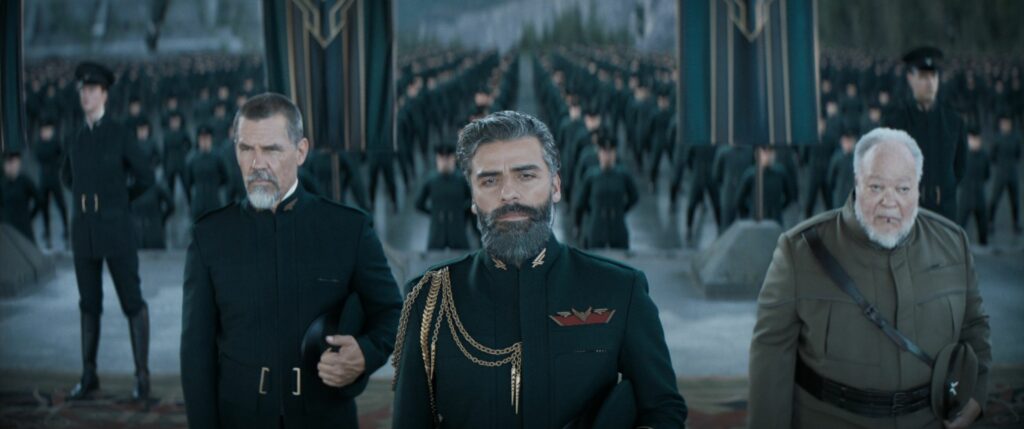
The novel has gone through some minor tinkering – the Fremen planetologist Liet Kynes has been recast as a woman (Sharon Duncan-Brewster pulls off the role admirably), while Baron Harkonnen’s nephew Feyd-Rauth (memorably played by Sting in Lynch’s disasterpiece) doesn’t make an appearance. (Or rather, doesn’t make an appearance yet; now’s as good a time as any to mention that the film is billed onscreen as Dune: Part One, and covers just over half of the novel.) But for the most part, Villeneuve and co. keep things faithful, excising a few of the convolutions involved in Herbert’s knotty worldbuilding while retaining enough details to keep existing fans on board.
So Villeneuve’s stamp on the film comes largely from its aesthetic approach, and here I’m torn on its merits. On one hand, Dune is a visually striking movie – one needs only look at those imposingly brutalist sets, or ornate costume designs. Experienced as a whole, however, the film starts to look overly tasteful, the screen a little washed out and muddy. The imperial factions favour angular greys and blacks, while Arrakis and its peoples add various shades of beige to the palette; the eyes of the Fremen, a vibrant blue owing to spice exposure, often seem like the only hint of colour in this universe. At times, it’s enough to make you long for the proposed surreal extravagance of the Jodorowsky version.
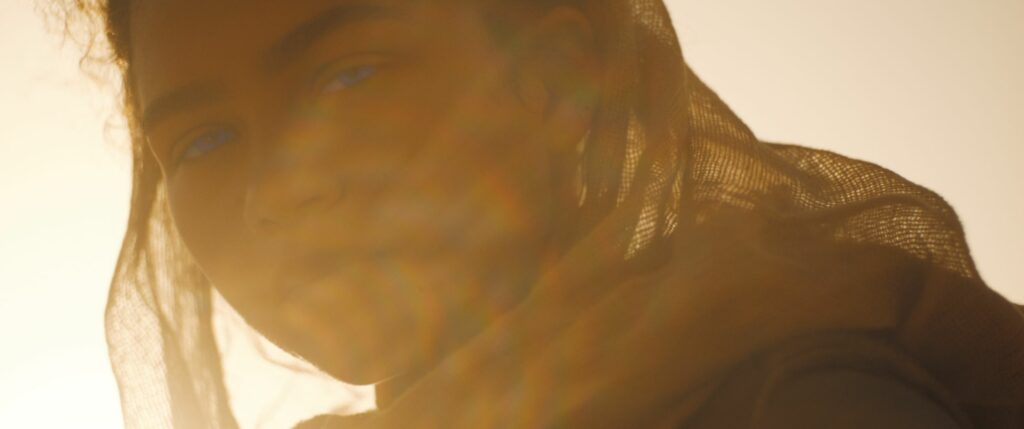
Though Villeneuve’s previous film, Blade Runner 2049, cribbed heavily from the look of its predecessor, it still managed to find moments of bold visual innovation. What it didn’t have was a Hans Zimmer soundtrack to match Vangelis’ original – and here Zimmer is up to his old tricks (or lack thereof) with another overbearing and underwhelming score, all thudding drums and dubiously Orientalist wailing and signature seat-shaking bwwonnngs. Zimmer’s music is too inoffensive to actively detract from the movie, but we’ve heard it all before.
The caveat to Dune’s successes – of which, it should be reiterated, there are many – is that it seems more like a polished version of everything that has come before than it does the bold step forward into the future of sci-fi filmmaking it wants you to think it is. Well, perhaps that’s not such an awful thing, especially when the results are as entertaining as this. The more pressing issue is that this is only half a film, curtailed abruptly in Fellowship of the Ring style. The fate of this film ultimately rests with the possibility of its sequel, which is currently pending approval from Warner Bros on the basis of Part One’s box-office performance – which is all the more reason to see Dune in a cinema.
Dune releases in cinemas October 21st.
